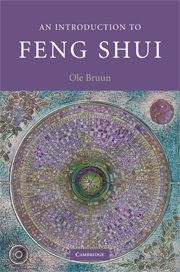Book contents
- Frontmatter
- Contents
- List of illustrations
- 1 Introduction
- 2 A brief history of feng shui
- 3 Feng shui in the context of Chinese popular religion
- 4 Feng shui research
- 5 Cosmological principles, schools of interpretation and the feng shui compass
- 6 Feng shui in the Chinese cityscape: China proper and overseas
- 7 Modern feng shui interpretations and uses
- 8 Environmental concerns
- 9 Feng shui as cultural globalization?
- Bibliography
- Index
7 - Modern feng shui interpretations and uses
Published online by Cambridge University Press: 05 June 2012
- Frontmatter
- Contents
- List of illustrations
- 1 Introduction
- 2 A brief history of feng shui
- 3 Feng shui in the context of Chinese popular religion
- 4 Feng shui research
- 5 Cosmological principles, schools of interpretation and the feng shui compass
- 6 Feng shui in the Chinese cityscape: China proper and overseas
- 7 Modern feng shui interpretations and uses
- 8 Environmental concerns
- 9 Feng shui as cultural globalization?
- Bibliography
- Index
Summary
Throughout the modern period, practically all writers on feng shui, Chinese and foreign alike, foresaw its rapid demise. The stance of these writers varied, depending on their belief in modern education, Christian enlightenment, Communism or just the power of progress, but their predictions were very similar. A few examples may suffice.
The missionary Joseph Edkins believed in the power of the light itself when he wrote: ‘the shining of true science may pale its ineffectual fire and cause it to disappear as a thing of darkness without special effort to bring about its extinction’ (Edkins 1872: 320). The Sinologist Herbert Giles described a system that, ‘in the last years [has] been shaken to its centre, and is now destined very shortly to collapse’ (Giles [1878] 1974: 71). E. J. Eitel in his famous treatise on feng shui predicted: ‘based as it is on human speculation and superstition and not on careful study of nature, it is marked for decay and dissolution’ (Eitel 1873, 1984: 69). The sinologist J. J. M. de Groot mocked it as ‘a mere web of speculative dreams and idle abstractions, the product of a credulous faith in absurd vagaries’ (de Groot 1897: 979), bound for destruction along with the ‘petrified’ culture that produced it. Although the Korean folklorist Hong-key Yoon wrote much later and from an entirely different perspective, his forecast was little brighter: ‘This naive but stable and harmonious culture–nature relationship has been ignored and overcome by so-called “modern civilization” ’ (Yoon 1976: 231).
- Type
- Chapter
- Information
- An Introduction to Feng Shui , pp. 144 - 172Publisher: Cambridge University PressPrint publication year: 2008

